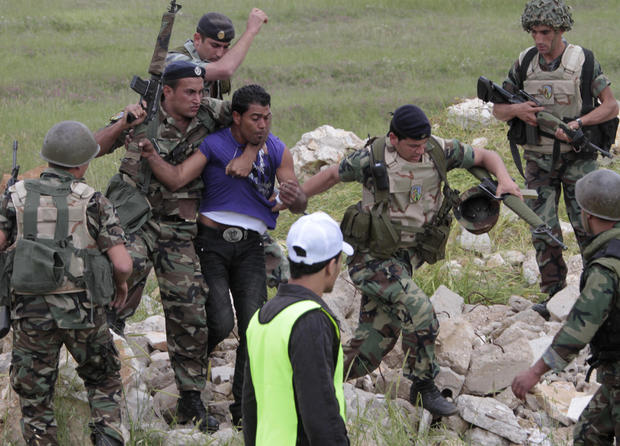The shadow of the "Nakba" demonstrations
For President Obama, today's violence along Israel's borders - in which predominantly Palestinian protesters demonstrated on the anniversary of the creation of the state of Israel and were fired on by Israeli troops - comes at a highly sensitive and busy time.
He has scheduled a Mideast policy speech for this coming Thursday, apparently planning to tie together the killing of Osama bin Laden, the pro-democracy uprisings in many Arab countries, the continuing NATO effort to push Muammar Qaddafi out of Libya, and the obviously frustrating efforts to promote Israeli-Palestinian peace talks.
Two days before his speech setting out American goals in the region, Mr. Obama will meet at the White House with Jordan's King Abdullah.
The day after the speech, Israel's Prime Minister Benjamin Netanyahu will visit the Oval Office. The President and Netanyahu have not always seen eye-to-eye in the past, but officials on both sides say Iran (and ways of stopping Tehran from developing nuclear weapons) is a central subject where they do generally agree. (Netanyahu will also deliver a speech to a joint meeting of Congress on May 24.)
Today's demonstrations - what activists called "Nakba" (Arabic for "catastrophe") - produced clashes at Israel's borders with Lebanon, Syria and the Gaza Strip. At least 12 people were killed.
This past Friday, at the Soref Symposium of the Washington Institute for Near East Policy, Israeli Major-General Amos Yadlin - who recently retired as director of military intelligence - warned that Arab governments might try to distract from their upheavals and challenges by inciting trouble with or inside Israel.
"We have to be much more aware of our borders," Yadlin said, "even the borders that have been quiet. Israel should avoid getting mixed up in provocations. We don't have to help anyone divert attention to Israel. In the past, maybe there were situations where we would react fiercely to provocations - but right now we should act more moderately."
More broadly, in this period Middle East experts are calling the "Arab Spring," Yadlin said he recommends that Israel not announce new initiatives or intervene in Arab upheavals. "The less we do, the better," he told the symposium in a Washington hotel. "We should support any international efforts, however, to help Egypt - with investments and tourism. I would advocate a new Marshall Plan to help Egypt. Even though the U.S. and other countries have budget limitations, the Saudis and other Gulf states - with their high oil revenues - can afford to help."
Yadlin said that if sweeping changes do create more democracies in the Arab world, that should be good for Israel. And the best thing that could happen, he said, would be for the wave of revolutions to spread eastward, to Iran. He suggested that could lessen or remove the threat of an Iranian nuclear bomb.
The director of another secretive Israeli security agency, however, is warning that unrest in Arab countries could result in new threats for the Jewish state.
Yoram Cohen, who took over the Shin Bet domestic security agency on Sunday, was apparently referring to the possible rise of radical Muslim parties in Egypt and other countries. "This negative potential can influence other threats that we now have to deal with on the Palestinian front," Cohen declared. "My agency will have to adapt quickly to the new strategic reality."
